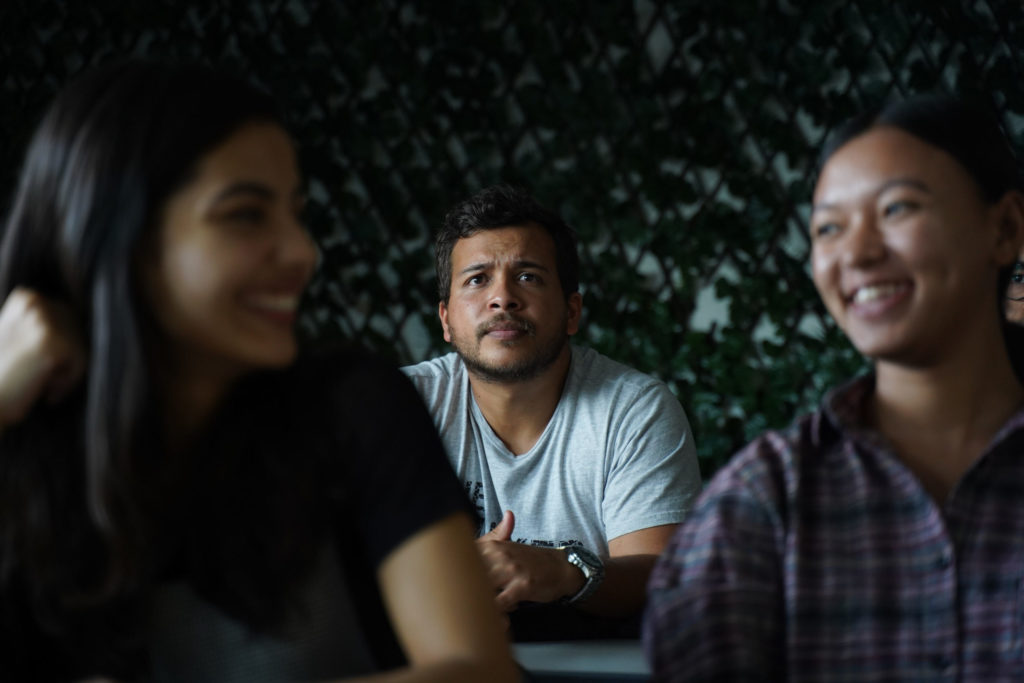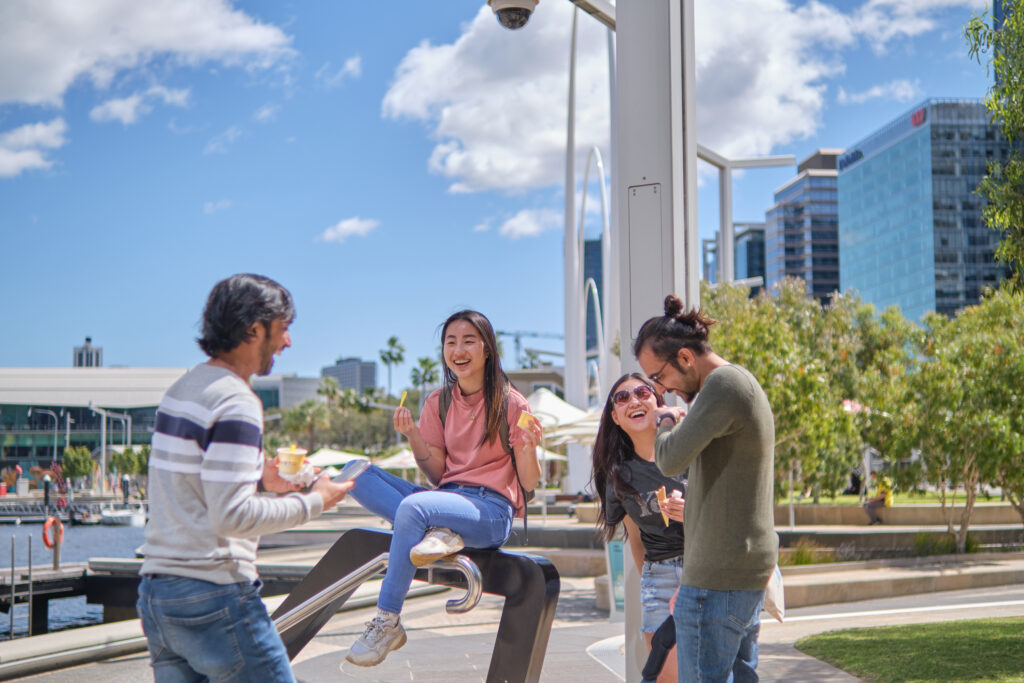Incredible. Eye-opening. Life-changing. Being an international student will undoubtedly be an experience you’ll remember forever… but that doesn’t mean it won’t come with some challenges: battling with loneliness, dealing with a different style of education, trying to find your favourite snacks from home, and, most confusingly, learning why Australians say “yeah, nah”, and “nah, yeah”.
Let’s run through the 10 most common challenges every international student will face, and how to combat them.
Language barriers
‘Arvo’, ‘avo’, ‘devo’… Australians have developed a unique language all of their own, filled with distinctive slang words. If English isn’t your first language, not only will you have to practise your English skills, but you’ll also have to prepare for a range of Aussie words that you’re unlikely to find in a textbook.
The best way to combat this is to practise your language skills by chatting to locals, taking English classes and attending writing workshops in Australia, and downloading Duolingo. If you’re really stuck on some particular slang, you can check out our guide. With enough exposure to the language, you’ll soon be communicating like a local.
(In case you’re wondering, ‘arvo’ – afternoon; ‘avo’ – avocado; ‘devo’ – devastated).
Culture shock
Australians have particular attitudes, customs and habits that might take some getting used to. It could be something small (such as restaurants closing at 9pm because locals eat dinner early, or how the bin system works) to bigger cultural differences (like the way people speak to and interact with one another). Clothing, food, teaching and learning styles, and people’s behaviours may also be completely different from what you’re accustomed to.
The culture shock might be disorienting at first, as you’re settling into a new way of life. But you’re not alone! To overcome culture shock, talk to other international students for support, stay in touch with family and friends back home, or do some activities that are familiar to you. It will just take a little time to adjust.
Making friends
Making new friends is a universal challenge, but it can be especially daunting when you move to a whole new country. Luckily, Australians are extremely friendly, and your fellow international students will also be looking to make friends.
Joining clubs and societies through your educational institution is a great way to meet people who share your interests, while student accommodation providers often host activity nights so you can meet other residents. If you want to make friends, but don’t want to leave your couch, that’s fine! Apps like Bumble BFF and Friendly match you up with other friends-in-need. Just keep in mind that eventually you should get off the couch and meet them, preferably for coffee. Aussies love coffee.
Finding a job
As an international student in Australia, you have the opportunity to work while you study. This means you’ll get work experience, gain valuable skills, meet new people and receive an income, which you can spend while you’re exploring Australia (or on weird Aussie foods).
To find a job, you need to know where to look. Successful job searching in Australia is about being proactive and patient. Job sites, your education provider’s careers service and social media are all great places to start your search. Once you’ve found some roles you want to apply for, you can follow our 7-step guide to getting a job.
Finding a home
Visa? Check. Bags? Packed. Passport? Found. What’s missing? Oh, that’s right, somewhere to live once you step off the plane.
Finding accommodation in Australia might seem daunting, but there are services and support systems in place to make the process as easy as possible. First, assess your accommodation options. If you’d prefer the ease of managed student accommodation, you can use this tool to match you to affordable options. If you’d prefer more independence, look for a private rental, but make sure you keep yourself safe from scams and know where to go if you need help.
Getting lost
You’re going to get lost in your first few weeks as an international student. It’s annoying, it’s inconvenient, but it’s going to happen as you get used to a new area. Give yourself extra time to get to where you need to go to account for this – no one likes to be the last one arriving at a lecture.
Fortunately, there’s Google Maps. It works throughout Australia, provides live travel updates (such as when roads are blocked), and has every city’s public transport system integrated, so you can use the app to organise your journeys. Eventually, you’ll know all of your city’s shortcuts.
Budgeting
You need money to cover living expenses like rent and groceries, but given you’ve just arrived in your new home, you also want to spend. New clothes to buy, new food to try, restaurants, bars, cinemas, theatres…
Budgeting your time in Australia is fairly simple – you just need to be aware of what you’re spending and where. There are numerous free apps you can download to help you track your expenses, or just keep a notebook. By looking for deals (as a student in Australia, you have access to a number of discounts on things like public transport and movies), making a budget and looking for part-time work, you’ll be money-smart in no time. But, always remember to treat yourself once in a while…
Homesickness
We won’t sugar-coat it: homesickness is the worst. But, again, it’s completely normal. Everyone will experience homesickness differently, but remember that it will pass.
To combat homesickness, keep yourself busy and engaged. Go out with new friends, attend classes, and develop a healthy routine to your new life. If you feel really stuck, your family and friends back home are just a Skype call away.
Educational expectations
Australia’s educational expectations and attitudes towards studies might be entirely different from what you’re used to. Relationships with your lecturers and tutors may be a lot more informal (it’s quite normal to call professors by their first names in Australia), and the focus in your course might be on completing a number of smaller assignments like reports and essays, rather than on exams.
In time, you’ll adjust to all of these expectations. If you’re struggling academically, your educational institution may provide resources such as coaching or study workshops, which can help you better understand what you need to do. Know that you can also speak to your tutors and course coordinators if you’re unsure of something.
Fear Of Missing Out (FOMO)
You may not have heard this term before, but we guarantee you will have felt this phenomenon at least once in your life. In essence, FOMO is the feeling of stress, mild anxiety or disappointment that you’re missing out on something great. And when you first move to Australia, you’ll experience it all the time. Should you have gone to the movie night organised by your accommodation? What about that campus tour you will miss? Are all your friends meeting for lunch, but you have to set up your bank account? Ugh!
You might think the solution is to never miss out on anything, but you’ll quickly exhaust yourself. FOMO is annoying, but it happens to everyone. Involve yourself where you can, but know that it’s OK to take a step back if you need some downtime.





